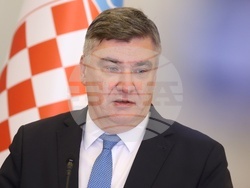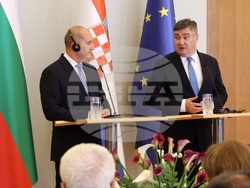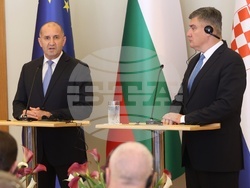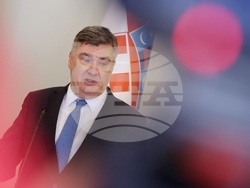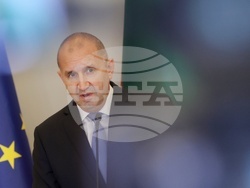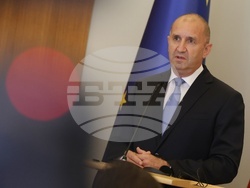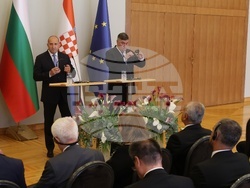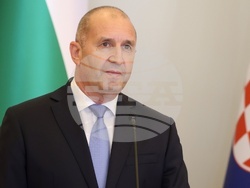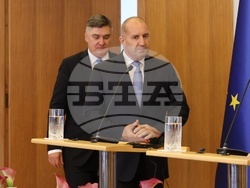site.btaDay One of President Radev's Visit to Croatia
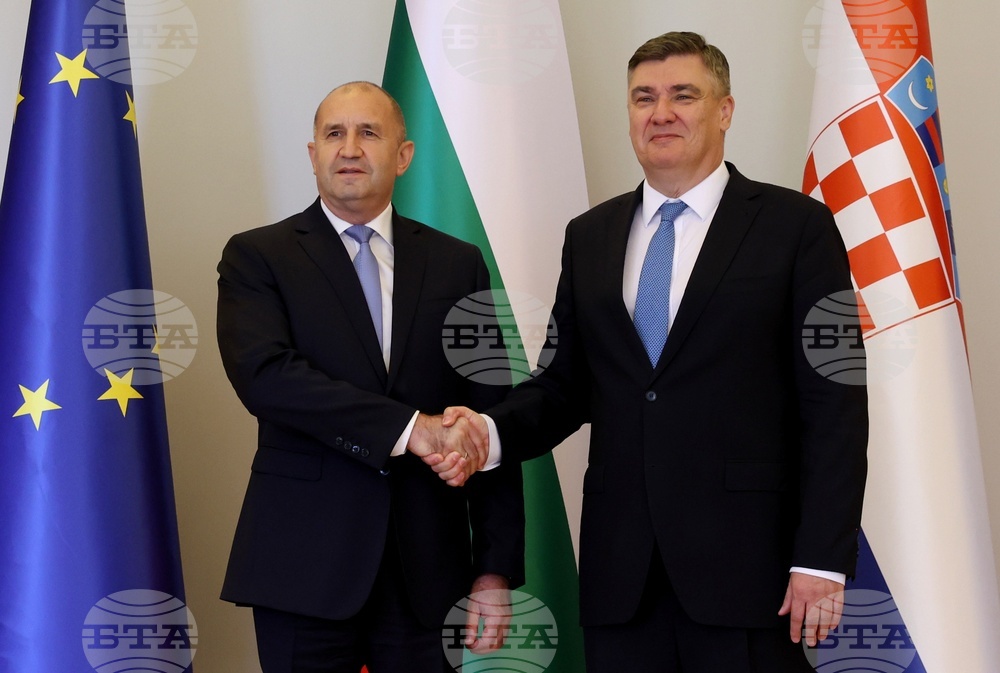

Bulgarian head of State Rumen Radev Monday began an official two-day visit to Croatia at the invitation of President Zoran Milanovic. The visit focuses on deepening bilateral cooperation between the two countries in the interest of stability and the European perspective of the region.
On the first day of his visit to Zagreb, the Bulgarian President held a one-on-one meeting with his Croatian counterpart and chaired the plenary talks between the two official delegations. Radev also held meetings with Parliament Speaker Gordan Jandrokovic and with Croatian Prime Minister Andrej Plenkovic. The President's press secretariat reported that during the meetings, the mutual desire for further deepening the historically friendly relations between Bulgaria and Croatia was confirmed and topical issues on the EU agenda and bilateral relations were discussed.
Also on Monday, Radev and representatives of the Bulgarian community in Croatia paid homage to Ivan Vazov at the monument to the Bulgarian writer in Zagreb, the President's press secretariat reported. In his address, the head of State said that the Bulgarians living in Croatia are an active part of contemporary Croatian society who with their activity contribute to the better image of Bulgaria and trust in the country. Bulgaria and Croatia have centuries-old historical and spiritual ties, President Radev said after laying a wreath at the monument. He stressed his gratitude to the Croatian people for the fact that in the most difficult years for Bulgaria - during the Ottoman rule, Bulgarians found a second homeland on Croatian soil. Radev noted the support of the Croatian people during the Revival period and the Bulgarian national liberation movement, which contributed to the preservation of the Bulgarian identity and freedom.
At a joint news briefing, Presidents Radev of Bulgaria and Milanovic of Croatia praised the bilateral relations and also talked about the eurozone and EU enlargement in relation to North Macedonia and Ukraine.
Bilateral ties
Milanovic described the bilateral ties as good, and said there are no challenges either now or in the future. “Our talks are always very substantive, and with President Radev, we can really talk about all the difficult issues in today's world,” the Croatian President added.
Radev said that Bulgaria and Croatia have established themselves as key factors for security and stability in Southeast Europe. Both, as members of NATO and the EU and as countries located at either end of the Western Balkans, share a common responsibility for the security, stability and prosperity of the region, with particular emphasis on the EU’s enlargement towards the Western Balkans. “We shared the view that both countries continue to actively develop their own defence capabilities and contribute to ensuring peace and security by enhancing NATO's overall defence potential and strengthening the European security system,” he said. “We share the assessment that our relations are at an excellent level and we want this dialogue at the highest political level to have the opportunity and help us develop active relations in all other areas of mutual interest. We discussed a number of areas in which we can continue our cooperation, from energy and connectivity to security and defence, culture, tourism and education,” Radev added.
Eurozone
Asked about his country's experience as an eurozone member since 2023, the Croatian President said the prices of certain things, such as real estate, have been rising sharply, and this cannot be explained by the living standards. Every country knows what is best for itself, said Milanovic. Finances are at the heart of how a state functions. Bulgaria has aligned with the criteria for joining the eurozone, while Romania has not. It has a high budget deficit because it chooses to - that is Romania's decision, said the Croatian President. He dismissed the claim that national currencies are no good. He said there is always powerful potential in having your own currency as a form of protecting the national interest. It is still too early to assess Croatia's experience with the euro. Once a decision is made, it must be carried through, he said, offering the following advice to Bulgarians: "Follow your own tradition and instincts".
President Radev commented that currency alone cannot be a guarantee for Bulgaria's full integration in the heart of Europe. "Such a guarantee is Bulgaria's efforts to develop as a normal, modern, democratic, European state with the rule of law, freedom of the media, free market economy, and this means transparency and equality in all public procurement, and protection of property. That is what will lead us to the heart of Europe. This requires very active work, not one-off efforts and a change of currency," Radev argued. The most important thing to take from Croatia's experience is to strike a balance between an information campaign, controls on unjustified price increases and incentives for the development of the economy and its competitiveness, Radev said further. "We are closely monitoring all the processes, we are using their experience so that some negative trends can be mitigated and more benefit can be derived from this process," he added.
EU enlargement
Milanovic also commented on the Republic of North Macedonia's EU accession process. In his words, President Gordana Siljanovska and Prime Minister Hristijan Mickoski, who belong to the same political party, firmly hold power and clearly do not wish to make compromises. The Croatian head of State noted that he was not in a position to say who is right or wrong in the relations between Bulgaria and North Macedonia. "I will not put myself in a position to pity someone for not being able to join the EU because life exists outside the EU as well," he said.
President Radev said Bulgaria is not blocking North Macedonia on its path to EU membership. The Republic of North Macedonia is holding itself back because it still does not want to fully comply with the Copenhagen criteria for membership, the head of State added. “It is very clearly stated there that one of the main criteria is non-discrimination and human rights. We have a clear consensus, adopted in July 2022, by the Bulgarian government, the government of the Republic of Macedonia, and all EU member states,” Radev commented. “We have been waiting for three years now for the Republic of North Macedonia to fulfil a clearly stated condition that would open the door to the start of negotiations - guaranteeing the equality of Bulgarians in the country by enshrining it in the Constitution. This is what we want. We are constructive and well-intentioned towards our neighbours despite their constant aggressive, provocative, and even hateful and insulting language towards us. We are doing everything possible to ensure that they fulfil the criteria and conditions that have been accepted and recorded,” Radev pointed out.
Regarding the EU accession of Ukraine, the Croatian President said Ukraine stands no chance of becoming a stronger military power than Russia. There are statements from the powers that be in Brussels that the aim is for Ukraine to become stronger than Russia, but there is no chance to see that happen, he said. Milanovic spoke of "the cynicism and hypocrisy of some European structures". Ukraine lacks a clearly defined territory and is unable to finance itself independently, he said. He called statements that Ukraine is closer to EU accession than Montenegro and North Macedonia "an insult" to those countries. "This is dishonest. We are destroying those countries," he said.
Radev argued that Ukraine's EU prospect is clear, but the path to full membership must pass through objective criteria for deep reforms, on a par with other candidate countries, and with a very well thought-out and balanced process. "Bulgaria supports Ukraine's determination and efforts to take the path of European integration. However, we all understand that this will be a long process, which needs to be considered very carefully. We have to be very objective," the Bulgarian head of State said. According to him, it would in no way be a good signal for the countries of the Western Balkans if Ukraine were given a preference just because of the geopolitical situation to be a member of the EU, without having implemented the same deep reforms that the Western Balkan countries are currently implementing: rule of law, counter-corruption, free elections, freedom of speech. "The most important thing at the moment is to achieve a sustainable and lasting peace in Ukraine so that we can deploy the most important foundation of democracy - elections. Currently, free elections cannot be held there because Ukraine is in a state of war," Radev added.
/RY/
Additional
news.modal.image.header
news.modal.image.text
news.modal.download.header
news.modal.download.text
news.modal.header
news.modal.text






































